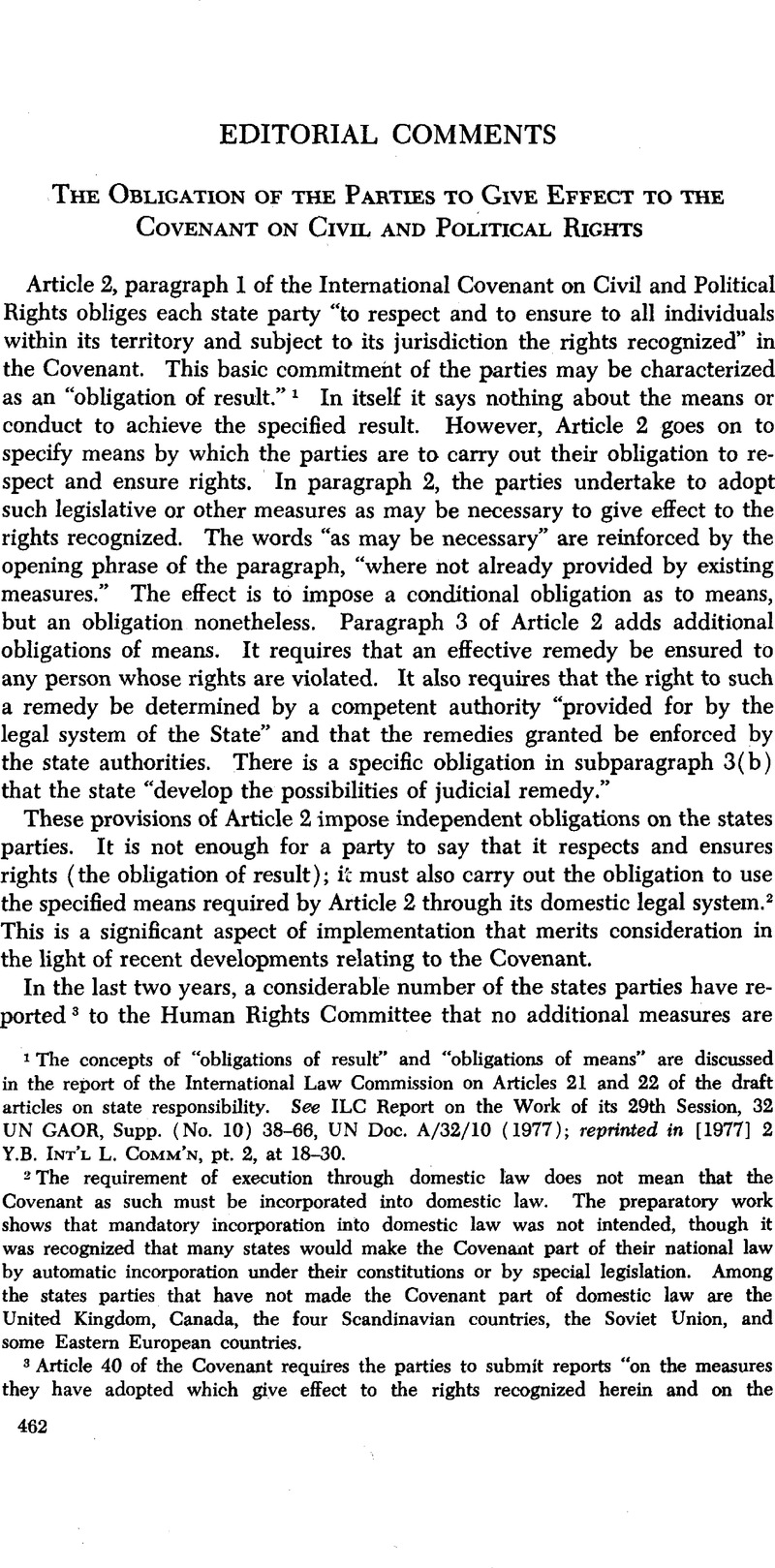Published online by Cambridge University Press: 27 February 2017

1 The concepts of “obligations of result” and “obligations of means” are discussed in the report of the International Law Commission on Articles 21 and 22 of the draft articles on state responsibility. See ILC Report on the Work of its 29th Session, 32 Un Gaor, Supp. (No. 10) 38-66, UN Doc. A/32/10 (1977); reprinted in [1977] 2 Y.B. INT'L L. COMM'N, pt. 2, at 18-30.
2 The requirement of execution through domestic law does not mean that the Covenant as such must be incorporated into domestic law. The preparatory work shows that mandatory incorporation into domestic law was not intended, though it was recognized that many states would make the Covenant part of their national law by automatic incorporation under their constitutions or by special legislation. Among the states parties that have not made the Covenant part of domestic law are the United Kingdom, Canada, the four Scandinavian countries, the Soviet Union, and some Eastern European countries.
3 Article 40 of the Covenant requires the parties to submit reports “on the measures they have adopted which give effect to the rights recognized herein and on the progress made in the enjoyment of those rights.” Twenty-seven states parties submitted reports in 1977 and 1978. The reports have been issued as UN documents in the series CCPR/C/1/Add. 1, etc. They have been discussed by the Human Rights Committee and summarized in that committee's report to the Economic and Social Council and the General Assembly. UN Doc. A/33/40 (1978). The summary records of the committee discussions are issued under the document symbol CCPR/ C/SR.
4 UN Doc. CCPR/C/1/Add. 17, at 1 (1977).
5 Mann, Britain's Bill of Rights, 94 L.Q. REV. 512, 521 (1978).
6 R. v. Chief Immigration Officer, Heathrow Airport ex parte Salamat Bibi, [1976] 3 All E.R. 843, 847-48.
7 See Mann, supra note 5, at 513, 514. Mann regards judicial review as essential to ensure human rights and he points out that the United Kingdom accepted judicial review when it adhered to the European Court of Human Rights.
8 See, e.g., discussions of reports of Czechoslovakia, CCPR/C/SR.64-66; Federal Republic of Germany, id., SR.92, 94, 96; Democratic Republic of Germany, id.. SR.67, 68; United Kingdom, id., SR.67, 69, 70; Soviet Union, id., SR.108, 109, 112.
9 Message from the President of the United States, transmitting four treaties pertaining to human rights, S. EXEC. DOCS. C, D, E, and F, 95th Cong., 2d Sess., at iii-iv (1978).
10 Id. at vi.
11 Ibid. The proposed declaration would not constitute a reservation since the Covenant does not require that it have self-executing effect in national law. However, the intended effect of the declaration would be to reduce the possibilities of judicial remedies in the United States, and one may question whether that would be in keeping with the intent of Article 2, paragraph 3(b), which requires parties to “develop the possibilities of judicial remedy.“
12 Article 27 of the Vienna Convention on the Law of Treaties, UN Doc. A/CONF. 39/27 (1969).
13 Reservation to the Convention on Genocide, Advisory Opinion, [1951] ICJ REP. 15.
14 Article 19 provides in effect that a state may not formulate a reservation which is “incompatible with the object and purpose of the treaty.“